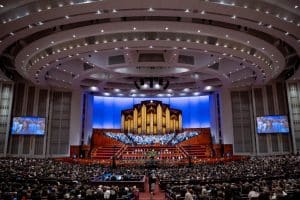 BYU Women’s Conference is an annual 2-day conference sponsored by the Relief Society and BYU. It’s promoted Church-wide, but there is a cost to attend (similar to Education Week). A committee organizes the conference, selecting the theme, speakers, and topics. Speakers include general authorities and auxiliary leaders as well as topic experts and lay people. I was asked to be part of the BYU/Relief Society Women’s Conference committee. The invitation was extended by the president of BYU and the Relief Society general presidency. I found it a very rewarding and insightful experience. The eye-rolling part: my stake president was apparently apoplectic that this “invitation” hadn’t gone through his approval. He had my bishop call me in to find out how I had become involved. The message I got: why YOU? He also brought it up at some other priesthood meeting as a bishop from another ward confided in me a couple of years later how upset the stake president was that he wasn’t able to okay what I’m assuming he thought was a calling.
BYU Women’s Conference is an annual 2-day conference sponsored by the Relief Society and BYU. It’s promoted Church-wide, but there is a cost to attend (similar to Education Week). A committee organizes the conference, selecting the theme, speakers, and topics. Speakers include general authorities and auxiliary leaders as well as topic experts and lay people. I was asked to be part of the BYU/Relief Society Women’s Conference committee. The invitation was extended by the president of BYU and the Relief Society general presidency. I found it a very rewarding and insightful experience. The eye-rolling part: my stake president was apparently apoplectic that this “invitation” hadn’t gone through his approval. He had my bishop call me in to find out how I had become involved. The message I got: why YOU? He also brought it up at some other priesthood meeting as a bishop from another ward confided in me a couple of years later how upset the stake president was that he wasn’t able to okay what I’m assuming he thought was a calling.
On a separate occasion, I helped organize a stake Relief Society program in which women shared very personal challenges and how their solutions came through Christ. Stories ranged from depression, wayward children, addiction, a crumbling marriage, etc. The meeting was impressively attended and incredibly impactful. However, the next day this same stake president called in the stake Relief Society president to rake her over the coals for “negative and inappropriate” messages. He said he would approve or PLAN any programs from then on.
And…this same stake president would not give my ward a budget for a ward Youth Conference because our bishop wasn’t submitting reports on time or something ridiculous. I was a Young Women counselor at the time; we were given $50 to feed 15 young men and young women at a 2-day weekend “conference” at our ward building.
– Anonymous
Pro Tip: Allow women to perform their responsibilities without micromanaging them. Provide women with the support and information they need.
Click here to read all of the stories in our #hearLDSwomen series. Has anything like this happened to you? Please share in the comments or submit your experience(s) to participate in the series.
“If any man have ears to hear, let him hear.” (Mark 4:23)






15 Responses
D&C 121:39 “We have learned by sad experience that it is the nature and disposition of almost all men, as soon as they get a little authority, as they suppose, they will immediately begin to exercise unrighteous dominion.”
I believe you. My stake president flat-out rejected my abuse report; picked it apart as lacking “credible evidence.” Gee, Mr College Professor who has zero years in law enforcement, I’m sorry I didn’t have a tape-recorded confession like McKenna Denson’s (and watch how deftly her Mormon judge is whittling THAT down anyway). Mormon men protect Mormon men, period. LDS priesthood is one of the largest, most powerful “no girls allowed” fraternities on the earth and it is shocking how the women pay tithes into it and “sustain” it with their obeisance and hours of service while being called “auxiliaries” to it like frat house maids. Mormon women have more of a voice when they become exMormon women, I am learning, because only then are we out of their reach–exMorrmon women are no longer “auxiliaries” who can be summoned to the men’s offices, assigned duties not of their choosing, called in for questioning, or in other ways tormented by the big fraternity.
You state that mormon women have more of a voice when they become exmormon women. I am hoping you will expound upon your statement. In what ways do you feel this is true? Do they have more of a voice inside or outside the church? Who do you feel is listening to them?
I am also curious about your use of the term auxiliaries. Usually in the church it refers to the suborganizations within a ward or stake, including Relief Society, Sunday School, Primary, Young Women, and Young Men, but you seem to indicate that it has been applied to women as individuals. Could you clarify if this has been your experience?
Women’s roles will always be auxiliary. There is the priesthood and there are auxiliaries. Yes, ym is auxiliary but they still have authoritative roles in the church. For example, if no adult men showed up to Sacrament, the teenage deacons, teachers, and priests would preside, not the adult women. If no males showed up, then there would be no sacrament meeting. If no women showed up, it would not matter at all. The sacrament could be administered and the meeting would progress as usual.
DB, women are treated as auxiliaries to their husbands. Or, maybe we are just his extra leg. But we are seen, not as separate people married to a husband, but as some kind of extension of him. It is hard to put into words, chattel? Property? Possessions? Wife.
Sure, the church talks about us being equal partners, but then turns around and treats married women as slightly less than children. If you don’t see it, it is because you don’t look.
Yes, it may be better than it was 50 years ago, but it is still there.
rtmtbc, I understand your point that women are only given callings and authority within auxiliary organizations, but to your example of the sacrament meeting, if no adult men showed up to sacrament meeting, there would be no sacrament meeting. The only ones authorized to preside at sacrament meeting are the bishopric, stake presidency, or someone specifically authorized by the stake president so if none of them showed up, everyone in attendance, including all the high priests and elders, would just go home. The ward YM organization has no authority outside of the YM organization just as the RS has no authority outside of RS, Primary has no authority outside of Primary, and EQ has no authority outside of EQ.
I’ll pose my question again to you and Anna, has it been your experience that the term auxiliaries has been applied to women as individuals? I am curious to know if this has actually been someone’s experience.
Why does it matter if the word gets used that way? That is our lived experience. We are appendages, auxiliaries, sub, property of our husbands. Unless you have lived it, don’t tell us that isn’t how it is in this church.
But the language is there, even if the word doesn’t get used that way. The man is the head of the family, so what does that make the wife? His right arm? You don’t have equals when one is the head of the other. You have a head and an appendage, or an auxiliary.
I suppose it might matter if it has been someone’s experience like EmilyB mentioned in her comment. It was something I had never heard before and wanted to clarify if that was actually what some women have experienced. Perhaps not so I suppose you’re right that it really doesn’t matter.
Since you asked, if the husband is the head of the family, then I would consider the wife to be the heart. Both equally important and dependent on each other. But that is just my perspective and I know everyone doesn’t see things the way I do.
What is wrong with the concept that they jointly are head of the family. Partners. Equals. That would make the husband equally at the heart of the family as mine is, not the 1950’s “leave it to Beaver” or “Father knows best” dad who comes home from work and disappears behind a newspaper, unless a child needs spanking.
Right now your concept is personally painful because at this moment my brother lies in a hospital. His heart still works, but his brain doesn’t. It lacked oxygen too long. He is worse than dead. But that is beside the point. But maybe it isn’t. I have seen men die because their “heart of the family” died and they simply could not go on emotionally because they relied too much on their wife for their emotional needs. It simply doesn’t work to have total “division of labor”.
My husband is not head of our family. We do that together. Neither of us makes a decision that affects the other, without a discussion and agreement. Sometimes it is more cumbersome, but it also stops one of us from doing what he/she wants that the other can’t live with.
I have seen so many families where the husband thinks he is head and does something his wife doesn’t like, and she withdraws into herself. That “heart” then is absent from the family in any real way. And the husband can’t understand what happened because he sees himself as head, he who makes important decisions. But the wife feels like “if he loved and respected me, he never would have done X without asking me how I felt and respecting my feelings as equal to his.
And don’t tell me about “of course the head has to respect the heart and take its needs into account.” These men THOUGHT they did. But they also thought that they had the God given right to make the final decision when there was a disagreement. And that since God gave them that job, the wife would come to agree, if she was a righteous woman. Just no. You don’t break someone’s heart and assume it is your god given right and God will fix the mess you make. God doesn’t come round cleaning up after us. That is the restitution part of things that you are responsible for.
Those couples are mostly divorced by now. It took some of them thirty years, but the wife eventually left.
Anna – Your marriage sounds very much like mine. My wife and I also don’t make decisions without discussion and agreement and never make any important decisions unless we both agree. That is the way it should be, one does not control or dominate the other, both working together, both compromising, putting their marriage before themselves. I’m very sorry for your brother and wish peace for your family.
Anna and DB, may I ask what your parent’s marriages were like? Do yours resemble theirs? Do yours resemble your spouse’s parents? I suppose I’m trying to tease out how much of our marriage practices are learned through church teachings versus intimate examples.
My dad died before I finished high school so I only ever saw my parents’ marriage through the eyes of a child. He worked and mom stayed home but that was already their situation when they joined the church. My MIL worked on and off throughout her marriage until she retired. I wouldn’t say my marriage is anything like my parents’ or my in-laws’. Different personalities, different generations, different environments, different levels of mental health. Personally, I think most marriages are shaped more by family and social experiences and influences than by church teachings. At least that’s been my experience. It’s also been my experience that people who live in areas with majority LDS populations often don’t distinguish between church, family, and society, conflating all three into one. Perception, as they say, is reality.
Thanks for the reply, DB. My parents died when I was in college, so while I got many good years with them, I still filtered everything in a child’s mindset. There was no parental guidance for any of my adult relationships. I have have found the same factors for my own marriage, but I am also fairly removed from church teachings. I didn’t attend as an adult until I was married in my very late twenties, my husband is a convert, and we live in an area of very few members.
My parents marriage was not really like the church says, although that is probably the closest model of who is “head of the house” but then they were the depression/WWII generation, and back then, men were always considered to be head of the house and wage earner, with a stay at home wife. So, my father had final decision power.
But it was different than the church “ideal” in that it two or three times crossed over into abuse. If my mother protested about how he was handling things, she got ignored, then if she continued to object, she got beaten. My mother was miserable. My father was also a narcissist and was incapable of any empathy for any one else, so he had no concept why my mother was so unhappy with him.
I knew I would leave the first week if my husband ever treated me the way my mother was treated.
So, you could say I learned how a marriage should be by example, bad example.
Thanks so much for the reply, Anna.